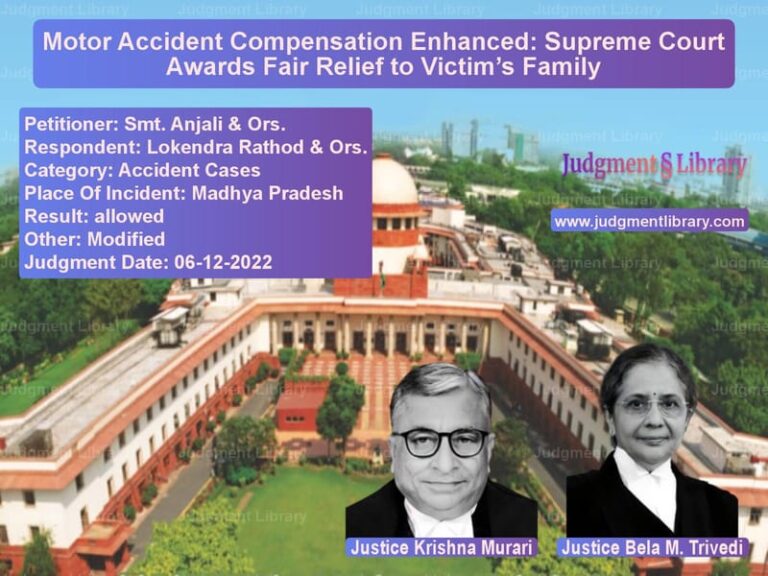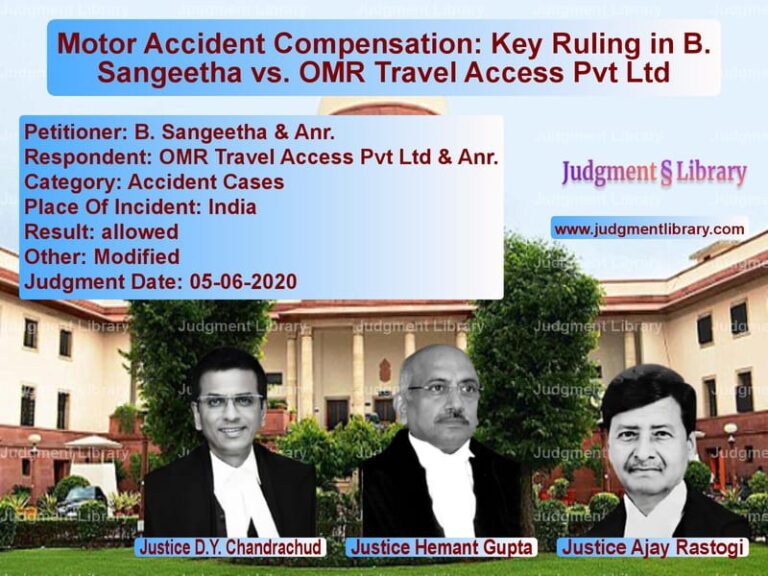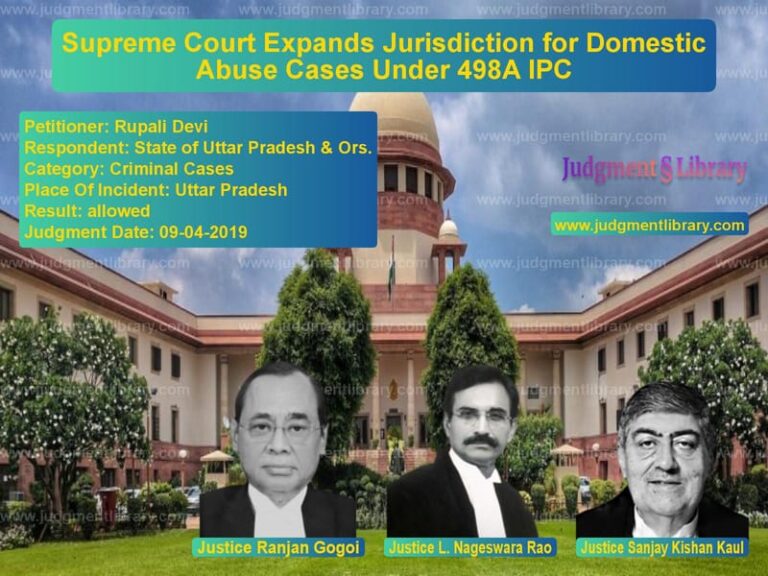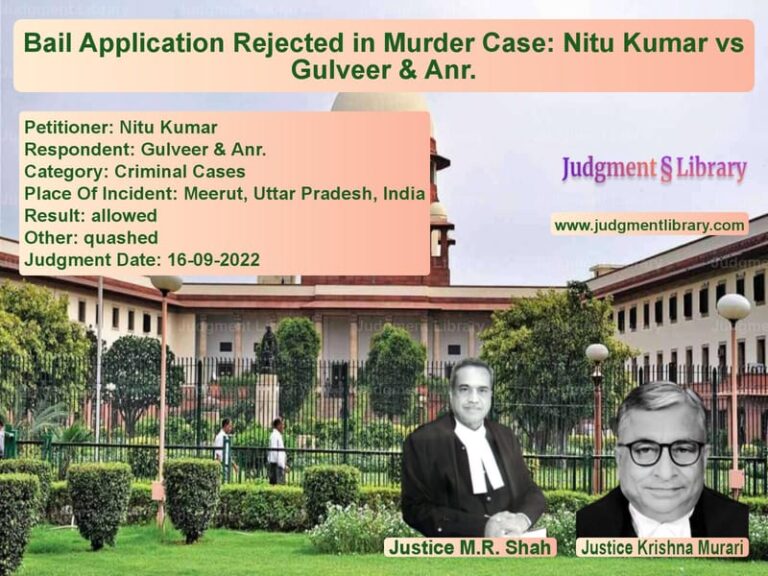Supreme Court Quashes Preventive Detention Order in Telangana Goonda Case
The Supreme Court of India has overturned the preventive detention order against the husband of petitioner Ameena Begum, ruling that the detention was unjustified under the Telangana Prevention of Dangerous Activities Act, 1986. The Court criticized the Telangana Police for misapplying the law to cases that should have been handled under regular criminal proceedings.
Background of the Case
The case arose from a detention order issued by the Commissioner of Police, Hyderabad, against the petitioner’s husband under Section 3(2) of the Telangana Prevention of Dangerous Activities Act, 1986. The detention order classified him as a ‘Goonda’ and was issued to prevent him from engaging in alleged criminal activities. The petitioner challenged this detention order before the Telangana High Court through a writ of habeas corpus, which was dismissed on 28 June 2023.
The appellant then approached the Supreme Court, arguing that the detention order was illegal, violated fundamental rights, and was based on stale and irrelevant allegations.
Key Allegations Against the Detenu
The Commissioner of Police cited the following reasons for detaining the appellant’s husband:
- He was a ‘habitual offender’ involved in multiple criminal cases.
- Between 2022 and 2023, he had committed nine offenses, including cheating, extortion, outraging the modesty of women, obstructing public servants, robbery, and criminal intimidation.
- Five specific FIRs were considered to justify the preventive detention order:
| FIR Number | Offenses | Date |
|---|---|---|
| 227/2022 | Sections 186, 189, 353, 504, 506 IPC | 28 July 2022 |
| 262/2022 | Sections 420, 384, 506 r/w 34 IPC | 10 October 2022 |
| 338/2022 | Sections 354, 420, 323, 506 r/w 34 IPC | 12 October 2022 |
| 18/2023 | Sections 506, 420, 406 r/w 34 IPC | 21 January 2023 |
| 35/2023 | Sections 392, 195A IPC | 8 February 2023 |
Petitioner’s Arguments
Senior counsel Mr. Luthra, representing the petitioner, argued:
- The detention order was illegal and violated fundamental rights.
- The allegations were already being prosecuted under regular criminal law, making preventive detention unnecessary.
- The offenses did not amount to a disturbance of public order, which is a necessary criterion for preventive detention.
- The Commissioner of Police failed to differentiate between ‘law and order’ and ‘public order’.
- The detenu was granted bail in some cases, but the authorities did not challenge these bail orders.
Respondents’ Arguments
The Telangana State Government, represented by Mr. Dave, argued:
- The Commissioner of Police was satisfied that preventive detention was necessary.
- The detenu was a habitual offender and had no regard for the law.
- He had been released on bail despite serious charges, and preventive detention was needed to curb his activities.
- The courts should not interfere with the subjective satisfaction of the detaining authority.
Supreme Court’s Observations
The Supreme Court bench, comprising Justices Surya Kant and Dipankar Datta, ruled in favor of the petitioner, setting aside the detention order. The Court made the following key observations:
1. Distinction Between ‘Law and Order’ and ‘Public Order’
The Court emphasized that not every crime disrupts public order. It referred to Ram Manohar Lohia vs. State of Bihar (1966), stating:
“Public order is the even tempo of the life of the community. A mere disturbance of law and order is not sufficient to justify preventive detention.”
2. Use of Preventive Detention as a Substitute for Regular Law
The Court noted that the detenu’s alleged activities were being prosecuted under regular criminal law and preventive detention should not be used as an alternative to normal judicial processes. It cited Rekha vs. State of Tamil Nadu (2011):
“If the ordinary law of the land can deal with a situation, recourse to preventive detention will be illegal.”
3. Failure to Challenge Bail Orders
The Court found that the State had not challenged the bail orders granted to the detenu, stating:
“Instead of using preventive detention, the prosecution should have sought cancellation of bail under regular law.”
4. Consideration of Stale and Extraneous Material
The Court observed that the Commissioner of Police had referred to the detenu’s past cases from 2019 and 2020, which had already been quashed by the Telangana High Court. It ruled that reliance on outdated cases to justify preventive detention was impermissible.
5. Preventive Detention Cannot Be Used to Overcome Judicial Orders
The Court held:
“Preventive detention cannot be used as a tool to circumvent the decisions of criminal courts granting bail.”
Supreme Court’s Final Verdict
Based on these findings, the Supreme Court:
- Set aside the detention order dated 24 March 2023.
- Declared that the detention was illegal and in violation of constitutional rights.
- Ordered the immediate release of the petitioner’s husband.
- Cautioned Telangana authorities against misuse of preventive detention laws.
Impact of the Judgment
This ruling sets an important precedent:
- Limits Misuse of Preventive Detention: Authorities must ensure detention is used only in extreme cases.
- Reinforces Criminal Justice Principles: Cases should be prosecuted under ordinary law instead of detention laws.
- Protects Individual Liberty: The ruling upholds fundamental rights under Article 21 of the Constitution.
- Clarifies Judicial Review: Courts can intervene when detention orders are based on irrelevant or stale material.
Conclusion
The Supreme Court’s decision in Ameena Begum vs. State of Telangana reinforces the principle that preventive detention should be a measure of last resort. By striking down an unjust detention order, the Court has reaffirmed the fundamental rights of individuals against arbitrary state action.
Petitioner Name: Ameena Begum.Respondent Name: State of Telangana & Ors..Judgment By: Justice Surya Kant, Justice Dipankar Datta.Place Of Incident: Hyderabad, Telangana.Judgment Date: 04-09-2023.
Don’t miss out on the full details! Download the complete judgment in PDF format below and gain valuable insights instantly!
Download Judgment: ameena-begum-vs-state-of-telangana-&-supreme-court-of-india-judgment-dated-04-09-2023.pdf
Directly Download Judgment: Directly download this Judgment
See all petitions in Bail and Anticipatory Bail
See all petitions in Custodial Deaths and Police Misconduct
See all petitions in Extortion and Blackmail
See all petitions in Judgment by Surya Kant
See all petitions in Judgment by Dipankar Datta
See all petitions in allowed
See all petitions in Quashed
See all petitions in supreme court of India judgments September 2023
See all petitions in 2023 judgments
See all posts in Criminal Cases Category
See all allowed petitions in Criminal Cases Category
See all Dismissed petitions in Criminal Cases Category
See all partially allowed petitions in Criminal Cases Category







